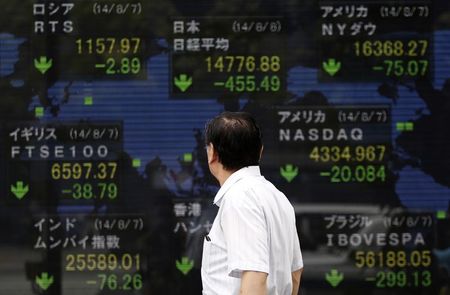By Lisa Twaronite
TOKYO (Reuters) - Asian shares tumbled on Friday as investors sought out safe-haven assets on growing fears that conflicts in Ukraine and the Middle East could sap global growth, extending losses after U.S. President Obama said he had authorized air strikes in Iraq.
Better-than-expected export growth from China pulled markets off their lows, but failed to offset all the gloom.
Obama said in an address that he authorized targeted strikes to protect the besieged Yazidi minority and U.S. personnel in Iraq, after the Iraqi government requested help.
U.N. Secretary-General Ban Ki-moon and the United Nations Security Council on Thursday called for the international community to help Iraq's government and people as the country struggles against a sweeping advance by Islamist militants.
MSCI's broadest index of Asia-Pacific shares outside Japan (MIAPJ0000PUS:) was off its lows but still dropped about 0.8 percent, on track for a weekly loss, while Japan's Nikkei stock average (N225:) plunged about 3 percent.
U.S. crude
"In the big scheme of things the moves feel overdone, but that's because volatility has been so low recently. Everyone said the volatility couldn't stay so low, that something would change it. This seems to be the event," said Richard Grace, chief currency and rates strategist at Commonwealth Bank of Australia.
S&P 500 e-mini futures
But markets edged away from their session lows after China reported that its exports in July jumped 14.5 percent from a year earlier, while imports fell 1.6 percent, leaving the country with a trade surplus of $47.3 billion (28.14 billion pounds) for the month. That beat market expectations of a 7.5 percent rise in exports, a 3 percent increase in imports and a trade surplus of $27 billion.
YIELDS UNDER PRESSURE
Risk-averse investors continued to seek the safety of fixed-income assets, sending U.S. yields to fresh 14-month lows as bond prices rose.
The yield on 10-year Treasuries
The yield on German Bunds slid to a record low of 1.069 percent
The European Central Bank said after its monthly policy-setting meeting on Thursday that it stands ready to take further easing steps to stave off deflation, and warned that the Ukraine crisis poses a serious risk.
Russia said on Wednesday it will ban all U.S. food imports and all European fruit and vegetables, in retaliation for Western sanctions imposed for Moscow's support of the Ukraine separatists.
A silver lining of the tensions was a weakening effect on Europe's currency, in line with the ECB's hopes. The euro stood close to nine-month lows against the greenback at $1.3362
The dollar slumped about 0.3 percent against the yen to 101.76
Japan's current account swung to a deficit in June for the first time in five months, government data showed on Friday, due to a decline in earnings on overseas investments.
"With the economic impact of the Ukrainian conflict now drawing more attention and Treasury yields declining, downward bias for the dollar is building," said Masafumi Yamamoto, market strategist at Praevidentia Strategy in Tokyo.
The Australian dollar slipped to a two-month low after the Reserve Bank of Australia stuck to its stance of keeping interest rates at a record low for some time yet. The Aussie was down 0.2 percent at $0.9254

The bearish trading environment saw gold
(Additional reporting by Wayne Cole in Sydney and Shinichi Saoshiro in Tokyo; Editing by Eric Meijer)
_800x533_L_1412520412.jpg)